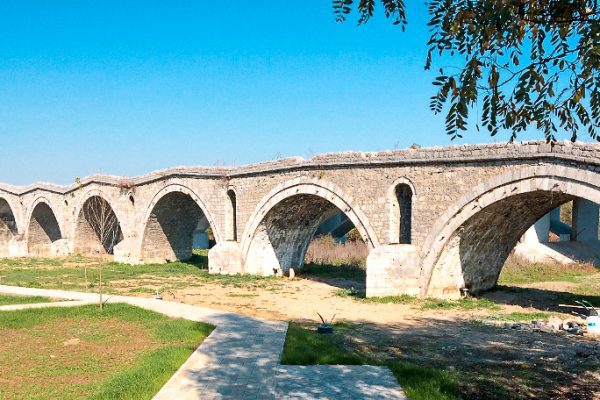Bridge as a Linguistic Metaphor
Written by DLS Serbo-Croatian instructor, Milos Ivanis
Learning a new language is a fun-filled way to build bridges to the unknown, some might say. That is, some might say it, but not everyone believes it.* Learning – contrary to the popular American myth that “learning is fun” – can be crushingly tedious. Only occasional, unintended humor makes this tedium tolerable.
My student, Michael, is a tenacious career diplomat. His face contorts into a grimace at using the wrong word. As his instructor, my advice that he not be too pent up and stay calm translates into his upset stomach. He easily confuses жито (grain), жила (vein), and живот (life), as all three words begin with the same syllable жи, ži.
He tells the story of a priest called to the bedside of a dying man to administer posljednje pravo. The adjective posljednji (or posljednja, or posljednje) means final, and the noun pravo means a right, as in the right to a cold beer. Pravo can also mean a law. As in, studirati pravo, to study law. (Hence, pravnik for a lawyer.) You can see how Michael’s confusion of similar-sounding Serbo-Croatian words goes back to his less than masterly command of English. Incidentally, the Serbian word for rite is obred.
The Yugoslav Nobelist, Ivo Andrić‘s best-known book (written in Serbo-Croatian) is Bridge on the Drina.
The original title was Na Drini Ćuprija. Ćuprija, a bridge, is not a Serbo-Croatian word, but a “slavicised” version of the Turkish word, köprü. The reason behind this reminds me of the Salinas Rodeo, where the Master Of Ceremonies explained they still pronounce it “rod-heo” (the Castillian way) rather than “raw-deeo (the Anglo way) in Salinas: “Ladies and gentlemen, rodeo is an English word, for Spanish rodeo, which means rodeo!”
My trip through Serbia and Kosovo, granting me a wonderful view of the above bridge on the dry riverbed, brought me to monasteries – old, ancient, and timeless. An attempt to chronicle by way of photography ends in an ignominious fiasco. Every place I walk into is a repository of sometimes numerous relics, said in Serbian mošti, мошти. The word is a pluralia tantum, as it refers to human remains.
An itinerant pilgrim, intent on traveling much of the route I took, writes to an acquaintance: A recite mi molim Vas da li se tamo u Manastiru nalaze mošti svete Milice i da li je moguće doći i prikloniti se moštima? (And tell me, please, are there – there in the Monastery – the relics of St. Milica, and if it is possible to come and bow before them?)
His correspondent replies promptly and civilly, “Da, mosti su u manastiru, na samom ulazu, i lako su dostupne.” (Yes, the relics are in the monastery, by the very entrance, and easily accessible.)
Here is where that famed American ‘fun of learning’ begins… or ends?!
Much of the confusion arises from the well-intentioned correspondent’s use of what is called “bald (not bold) Latinica.” The letter that should have been used Š equivalent of Cyrillic Ш, pronounced like the English “s” in “sugar,” was replaced by a simple S. Google, consequently, gives us a lighter view of sainthood: “Yes, the bridges are in the monastery, at the very entrance and are easily accessible.”
Thus, mošti became mosti taken to mean ‘bridges’ by pidgin Serbo-Croatian. Most, a bridge, (noun, masculine) belongs to a group of monosyllabic nouns, generally of masculine gender, where a Nominative plural is not achieved by simply adding an i to the Nominative singular, but, instead, receives an additional suffix -ovi. Thus, instead of most – mosti, rat – rati, rog – rogi, the plurals are: mostovi, ratovi, rogovi. This, however, should not make you feel safely “out of the woods.”
The Serbo-Croatian word for finger is prst (masculine gender) where r acts as a vowel, much the same as the English y does in tryst. The plural of prst, however, is not prstovi, pursuant to the general rule outlined above, but prsti. If this has now given you a sense of balance and a feel of “knowing” when to use which, you are welcome to prove yourself wrong: Krst, a Serbian word for cross (Croatian word is križ) which, clearly, rhymes with prst reverts back to the rule, and the Nominativ plural is not krsti but krstovi. Got that? I didn’t!
By now, you realize the instructor’s duty is not only to comfort the afflicted but also to afflict the comfortable!
Generally, explaining the grammatical intricacies of the seven cases of Serbo-Croatian declensions is not this difficult. But then, neither is accepting the fact that learning is not fun!*
At this point, I’m sure you’ll agree that Michael’s offense is no graver than the media’s as they insist on referring to “narrow misses” or “near collisions” as “near misses.” A near miss is an actual hit, but try telling that to news editors!
*I am grateful to the late William Jovanovich, notable American publisher, and author.
For more DLS, check out other blogs and visit us on Facebook, LinkedIn, Instagram, or Twitter!




